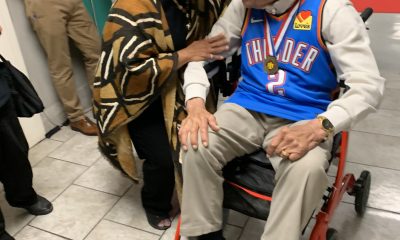#NNPA BlackPress
LA Activists Drill Down on Who Deserves Reparations for Slavery and Why

Two bills calling for the study of reparations owed to African Americans are making their way through both the California legislature and the U.S. House of Representatives.
As state and federal lawmakers grapple with whether or not the State of California — and the United States as a whole — should take a closer look at what it owes the descendants of enslaved Africans in the United States, a group of Black California activists are getting ahead of the conversation. They are distilling the case for reparations down to why African Americans deserve to get paid for centuries of free labor and the Jim Crow laws and other forms of state-enforced discriminatory practices that followed. They are also specifying which segment of Black Americans should get those payments.
On July 12, the Los Angeles chapter of American Descendants of Slavery (ADOS) hosted a live stream that dug down into the complexities of securing reparations for the descendants of enslaved Black people in the United States.
They broadcasted the 90-minute special both on YouTube and Facebook. Experts on the history of the Black experience in America laid out the case for reparations. After that, ADOS activists followed with and a no-holds-barred conversation on race, racism and reparations. They discussed how some Americans, people of other races and some Blacks, too, often misunderstand the arguments at the foundation of their agenda.
The live stream featured Dr. William A. Darity and A. Kirsten Mullen, co-authors of “From Here to Equality: Reparations for Black Americans in the Twenty-First Century.” The husband-and-wife duo started the show by denouncing the notion that slavery in America is ancient history.
“When you’re thinking about slavery from a generational perspective, it’s not that long ago,” Mullen said. “The legacy of slavery is something that we’re still feeling today.”
Darity noted that reparations should not be distributed exclusively to mitigate the effects of generational slavery but to recompense for all of the oppressive economic systems that have targeted Black people in America for centuries.
“The case that we build in ‘From Here to Equality’ is not restricted to so-called slavery reparations in the first place,” Darity said. “Our premise is that there is a series of atrocities that have been inflicted on Black Americans that have affected their economic status. So, we begin with slavery but then we move into the post-slavery era where the first atrocity was the failure to provide the formerly enslaved with any form of restitution.”
Darity mentioned the 1921 Tulsa Race Massacre, also known as the fall of Black Wall Street, citing it as one example of the ways Black people experienced economic violence in America.
He asserted that the racial wealth disparity in the US can be directly tied to atrocities like that committed by citizens as well as systemic discriminatory practices, and it can be assuaged with reparations.
“While 25% of white households have a net worth in excess of $1 million, it is only 4% for Black households in the United States. So, to close that gap would require an allocation of funds that would at least amount to 10 to 12 trillion dollars and that’s what we think should be one of the central objectives of a Black reparations project.”
As far as policy, Darity briefly talked about speaking to Congress about H.R. 40, also known as the Commission to Study and Develop Reparation Proposals for African-Americans Act, which is a bill that was introduced last year that if implemented would create a commission to determine the merits and logistics of providing reparations for the descendants of Black slaves.
Since its televised introduction in the House Judiciary Committee last year, legislators in the lower house of the U.S. Congress have not revisited H.R. 40. The bill would expire if no action is taken on it before the 116th Congress ends in January.
In California, on June 11, the State Assembly voted 61-12 to approve AB 3121, titled the Task Force to Study and Develop Reparation Proposals for African Americans. The Senate Judiciary Committee is now reviewing the legislation before it holds a hearing and votes on it. If passed, the bill would be referred to the full Senate for an up-or-down vote.
Last week, in Asheville, North Carolina, the city Council apologized for the town’s role in slavery and discrimination and i5 voted to provide reparations for its Black residents in the form of investments in areas where Black residents face inequities.
Antonio Moore, a Los Angeles-based attorney and ADOS co-founder, says the distinction between descendants of slaves and other Black Americans does make a difference when it comes to generational wealth, citing former President Barack Obama and U.S. Sen. Kamala Harris (D-CA) as his examples.
“What do you do in a world where your first Black president inherited $500,000 from his White lineage and your possible, most likely, first Black Vice President basically lived as an elite ‘Indian’ – they out-earn White folks, and then told you that she’s just as Black as you because she went to Howard,” he said.
Moore was referring to $500,000 in stocks President Barack Obama and his wife Michelle Obama reportedly inherited from the former POTUS’ maternal grandparents’ estate. Regarding Harris, he was pointing to Insight Center study, The Color of Wealth, that revealed that “Asian Indian” families (Harris’ mother, who is deceased, was Indian) has the second-highest median net worth ($460,000) of all sub-groups in Los Angeles County. They are outpaced in L.A. County by Japanese households ($592,000) and followed by Chinese ones ($408,000). U.S. Black median net worth in Los Angeles County ranks the lowest at $4,000.
According to a Gallup News poll conducted in 2019, 27% of Black Americans are opposed to the United States making cash payments to individuals for reparations.
“I’m not saying that acknowledging history doesn’t matter. It does. I’m saying that there is a difference between acknowledging history and allowing history to distract us from the problems we face today,” said Coleman Hughes, a columnist at the online magazine Quillette and a 2020 graduate of Columbia University.
Hughes, who testified against HR 40 before the House Judiciary Committee in June 2019, said paying reparations to all descendants of Black people in the United States who were slaves, “is a mistake.”
“Take me as an example. I was born three decades after the end of Jim Crow into a privileged household in the suburbs. I attend an Ivy League school,” he said at the congressional hearing. “Yet I’m descended from slaves who worked on Thomas Jefferson’s Monticello plantation.”
ADOS has faced pointed criticisms from several prominent media personalities and other Black activists. They say the organization engages in disinformation and divisive rhetoric, some saying the movement’s specific focus on descendants of slaves weakens Black communities, pitting Black immigrant groups against Black American descendants of enslaved people in the United States.
“The movement relies heavily on right-wing, anti-Black, anti-immigrant talking points, and a series of policy positions reliant on a person’s ability to produce documentation or what I am calling ‘slave papers’ in order to verify Black native identity,” said Jessica Ann Mitchell Aiwuyor, a writer for the Institute of the Black World 21st Century. “If implemented, the end result of these policies could be a weakened, further marginalized Black population.”
Yvette Carnell, co-founder and host of the ADOS media outlet “Breaking Brown,” addressed some of these criticisms during the show.
#NNPA BlackPress
IN MEMORIAM: Ramona Edelin, Influential Activist and Education Advocate, Dies at 78
NNPA NEWSWIRE — Born on September 4, 1945, in Los Angeles, California, activist Ramona Edelin’s early years were marked by a commitment to education and social justice. According to her HistoryMakers biography, after graduating from Fisk University with a Bachelor’s degree in 1967, she pursued further studies at the University of East Anglia in England. She earned her master’s degree before completing her Ph.D. at Boston University in 1981.
The post IN MEMORIAM: Ramona Edelin, Influential Activist and Education Advocate, Dies at 78 first appeared on BlackPressUSA.

By Stacy M. Brown, NNPA Newswire Senior National Correspondent
@StacyBrownMedia
Once upon a time, Black Americans were simply known as colored people, or Negroes. That is until Ramona Edelin came along. The activist, renowned for her pivotal roles in advancing civil rights, education reform, and community empowerment, died at her D.C. residence last month at the age of 78. Her death, finally confirmed this week by Barnaby Towns, a communications strategist who collaborated with Dr. Edelin, was attributed to cancer.
Born on September 4, 1945, in Los Angeles, California, Edelin’s early years were marked by a commitment to education and social justice. According to her HistoryMakers biography, after graduating from Fisk University with a Bachelor’s degree in 1967, she pursued further studies at the University of East Anglia in England. She earned her master’s degree before completing her Ph.D. at Boston University in 1981.
Edelin’s contributions to academia and activism were manifold. She was pivotal in popularizing the term “African American” alongside Rev. Jesse L. Jackson in the late 1980s.
Jackson had announced the preference for “African American,” speaking for summit organizers that included Dr. Edelin. “Just as we were called Colored, but were not that, and then Negro, but not that, to be called Black is just as baseless,” he said, adding that “African American” “has cultural integrity” and “puts us in our proper historical context.”
Later, Edelin told Ebony magazine, “Calling ourselves African Americans is the first step in the cultural offensive,” while linking the name change to a “cultural renaissance” in which Black Americans reconnected with their history and heritage.
“Who are we if we don’t acknowledge our motherland?” she asked later. “When a child in a ghetto calls himself African American, immediately he’s international. You’ve taken him from the ghetto and put him on the globe.”
The HistoryMakers bio noted that Edelin’s academic pursuits led her to found and chair the Department of African American Studies at Northeastern University, where she established herself as a leading voice.
Transitioning from academia to advocacy, Edelin joined the National Urban Coalition in 1977, eventually ascending to president and CEO. During her tenure, she spearheaded initiatives such as the “Say Yes to a Youngster’s Future” program, which provided crucial support in math, science, and technology to youth and teachers of color in urban areas. Her biography noted that Edelin’s efforts extended nationwide through partnerships with organizations like the National Science Foundation and the United States Department of Education.
President Bill Clinton recognized Edelin’s expertise by appointing her to the Presidential Board on Historically Black Colleges and Universities in 1998. She also co-founded and served as treasurer of the Black Leadership Forum, solidifying her standing as a respected leader in African American communities.
Beyond her professional achievements, Edelin dedicated herself to numerous boards and committees, including chairing the District of Columbia Educational Goals 2000 Panel and contributing to the Federal Advisory Committee for the Black Community Crusade for Children.
Throughout her life, Edelin received widespread recognition for her contributions. Ebony magazine honored her as one of the 100 Most Influential Black Americans, and she received prestigious awards such as the Southern Christian Leadership Award for Progressive Leadership and the IBM Community Executive Program Award.
The post IN MEMORIAM: Ramona Edelin, Influential Activist and Education Advocate, Dies at 78 first appeared on BlackPressUSA.
#NNPA BlackPress
Tennessee State University Board Disbanded by MAGA Loyalists as Assault on DE&I Continues
NNPA NEWSWIRE — Recent legislative actions in Tennessee, such as repealing police reform measures enacted after the killing of Tyre Nichols, underscore a troubling trend of undermining local control and perpetuating racist agendas. The new law preventing local governments from restricting police officers’ authority disregards community efforts to address systemic issues of police violence and racial profiling.
The post Tennessee State University Board Disbanded by MAGA Loyalists as Assault on DE&I Continues first appeared on BlackPressUSA.

By Stacy M. Brown, NNPA Newswire Senior National Correspondent
@StacyBrownMedia
Tennessee State University (TSU), the state’s only public historically Black college and university (HBCU), faces a tumultuous future as Gov. Bill Lee dissolved its board, a move supported by racist conservatives and MAGA Republicans in the Tennessee General Assembly, who follow the lead of the twice-impeached, four-times indicted, alleged sexual predator former President Donald Trump. Educators and others have denounced the move as an attack on diversity, equity, and inclusion (DE&I) and a grave setback for higher education.
Critics argue that TSU’s purported financial mismanagement is a manufactured crisis rooted in decades of underinvestment by the state government. They’ve noted that it continues a trend by conservatives and the racist MAGA movement to eliminate opportunities for Blacks in education, corporate America, and the public sector.
Gevin Reynolds, a former speechwriter for Vice President Kamala Harris, emphasizes in an op-ed that TSU’s financial difficulties are not the result of university leadership because a recent audit found no evidence of fraud or malfeasance.
Reynolds noted that the disbanding of TSU’s board is not an isolated incident but part of a broader assault on DE&I initiatives nationwide. Ten states, including Tennessee, have enacted laws banning DE&I policies on college campuses, while governors appointing MAGA loyalists to university trustee positions further undermine efforts to promote inclusivity and equality.
Moreover, recent legislative actions in Tennessee, such as repealing police reform measures enacted after the killing of Tyre Nichols, underscore a troubling trend of undermining local control and perpetuating racist agendas. The new law preventing local governments from restricting police officers’ authority disregards community efforts to address systemic issues of police violence and racial profiling.
The actions echo historical efforts to suppress Black progress, reminiscent of the violent backlash against gains made during the Reconstruction era. President Joe Biden warned during an appearance in New York last month that Trump desires to bring the nation back to the 18th and 19th centuries – in other words, to see, among other things, African Americans back in the chains of slavery, women subservient to men without any say over their bodies, and all voting rights restricted to white men.
The parallels are stark, with white supremacist ideologies used to justify attacks on Black institutions and disenfranchise marginalized communities, Reynolds argued.
In response to these challenges, advocates stress the urgency of collective action to defend democracy and combat systemic racism. Understanding that attacks on institutions like TSU are symptomatic of broader threats to democratic norms, they call for increased civic engagement and voting at all levels of government.
The actions of people dedicated to upholding the principles of inclusivity, equity, and justice for all will determine the outcome of the ongoing fight for democracy, Reynolds noted. “We are in a war for our democracy, one whose outcome will be determined by every line on every ballot at every precinct,” he stated.
The post Tennessee State University Board Disbanded by MAGA Loyalists as Assault on DE&I Continues first appeared on BlackPressUSA.
#NNPA BlackPress
Braxton Haulcy and the Expansion of Walker|West Music Academy
May 24, 2023 – Walker West Music Academy gets an early start on expansion. Join us for a Wednesday episode of The …
The post Braxton Haulcy and the Expansion of Walker|West Music Academy first appeared on BlackPressUSA.

May 24, 2023 – Walker West Music Academy gets an early start on expansion. Join us for a Wednesday episode of The …
The post Braxton Haulcy and the Expansion of Walker|West Music Academy first appeared on BlackPressUSA.
-

 Community2 weeks ago
Community2 weeks agoFinancial Assistance Bill for Descendants of Enslaved Persons to Help Them Purchase, Own, or Maintain a Home
-

 Activism3 weeks ago
Activism3 weeks agoOakland Post: Week of April 3 – 6, 2024
-

 Business2 weeks ago
Business2 weeks agoV.P. Kamala Harris: Americans With Criminal Records Will Soon Be Eligible for SBA Loans
-

 Activism2 weeks ago
Activism2 weeks agoOakland Post: Week of April 10 – 16, 2024
-

 Community2 weeks ago
Community2 weeks agoAG Bonta Says Oakland School Leaders Should Comply with State Laws to Avoid ‘Disparate Harm’ When Closing or Merging Schools
-

 Community1 week ago
Community1 week agoOakland WNBA Player to be Inducted Into Hall of Fame
-

 Community2 weeks ago
Community2 weeks agoThe Year Ahead: Assembly Speaker Rivas Discusses Priorities, Problems
-

 Community1 week ago
Community1 week agoRichmond Nonprofit Helps Ex-Felons Get Back on Their Feet

























































